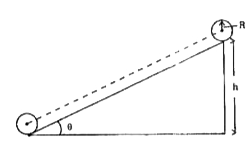Three bodies, a ring, a solid cylinder and a solid sphere roll down the same inclined plane without slipping. They start from rest. The radii of the bodies are identical. Which of the bodies reaches the ground with maximum velocity?
We assume conservation of energy of the rolling body, i.e. there is no loss of energy due to friction etc. The protential energy lost by the body in rolling down the inclined plane (= mgh) must, therefore, be equal to kinetic energy gained. Since the bodies start from rest the kinetic energy gained is equal to the final kinetic energy of the odies.
From K=12mυ2cm[1+k2R2].
K=12mv21+(K2R2). Where v is the final velocity of (the centre of mass of) the body. Equation K and mgh.

or ∴υ2=(2gh1+k2/R2)
Note v2 is independent of the mass of the rolling body :
For a ring, k2=R2
vring=√2gh1+1=√gh
For a solid cylinder K2=R2/0.2
vdisc=√2gh1+1/2=√4gh3
For a solid sphere K2=2R2/5
vsphere=√2gh1+1/52=√10gh7
Similar Questions
Three bodies, a ring, a soild cylinder and a soild sphere roll down the same inclined plane without slipping. They start from rest. The radii of the bodies are identical. Which of the bodies reaches the ground with maximum velocity ?
View SolutionThree bodies, a ring, a soild cylinder and a soild sphere roll down the same inclined plane without slipping. They start from rest. The radii of the bodies are identical. Which of the bodies reaches the ground with maximum velocity ?
View Solution
Knowledge Check
Three bodies, a ring, a soild cylinder and a soild sphere roll down the same inclined plane without slipping. They start from rest. The radii of the bodies are identical. Which of the bodies reaches the ground with maximum velocity ?
ARingBSolid cylinderCSolid sphereDAll reach the ground with same velocityThree bodies a ring (R), a solid cylinder (C) and a solid sphere (S) having same mass and same radius roll down the inclined plane without slipping. They start from rest, if VR. VcandVs are velocities of respective bodies on reaching the bottom of the plane, then
AvR=vC=vSBvR>vC>vSCvR<vC<vSDvR=vC=vSA ring starts to roll down the inclined plane of height h without slipping . The velocity when it reaches the ground is
A√10gh7B√4gh7C√10gh3D√gh
A ring, a solid cylinder and sphere are rolled down on an inclined plane without slipping. Velocity of centre of mass is
View SolutionConsider a situation in which a ring, a solid cylinder and a solid sphere roll down on the same inclined plane without slipping. Assume that they start rolling from rest and having identical diameter.
The correct statement for this situation is:-
View SolutionThree bodies a disc, a ring, a solid sphere of same radius, same mass are rolling down the same inclined plane without slipping. Which of three will reach the ground with minimum velocity ?
View SolutionA ring starts to roll down the inclined plane of height h without slipping . The velocity when it reaches the ground is
View SolutionA ring, a solid cylinder, a hollow sphere and a solid sphere are released from rest on an inclined plane from same level. If there is no slipping then which one of these will reach the ground at last?
View Solution
